初中英语中考情态动词考点及练习汇编
初中情态动词知识点及习题(附答案)
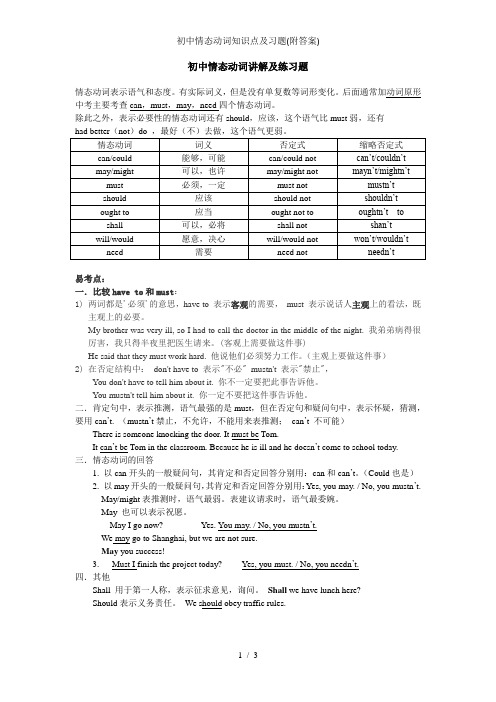
初中情态动词讲解及练习题情态动词表示语气和态度。
有实际词义,但是没有单复数等词形变化。
后面通常加动词原形中考主要考查can,must,may,need四个情态动词。
除此之外,表示必要性的情态动词还有should,应该,这个语气比must弱,还有易考点:一.比较have to和must:1) 两词都是'必须'的意思,have to表示客观的需要,must 表示说话人主观上的看法,既主观上的必要。
My brother was very ill, so I had to call the doctor in the middle of the night.我弟弟病得很厉害,我只得半夜里把医生请来。
(客观上需要做这件事)He said that they must work hard.他说他们必须努力工作。
(主观上要做这件事)2) 在否定结构中:don't have to 表示"不必" mustn't表示"禁止",You don't have to tell him about it. 你不一定要把此事告诉他。
You mustn't tell him about it. 你一定不要把这件事告诉他。
二.肯定句中,表示推测,语气最强的是must,但在否定句和疑问句中,表示怀疑,猜测,要用can’t. (mustn’t禁止,不允许,不能用来表推测;can’t 不可能)There is someone knocking the door. It must be Tom.It can’t be Tom in the classroom. Because he is ill and he doesn’t come to school today.三.情态动词的回答1. 以can开头的一般疑问句,其肯定和否定回答分别用:can和can’t。
中考(完整版)英语情态动词专项练习附解析含答案
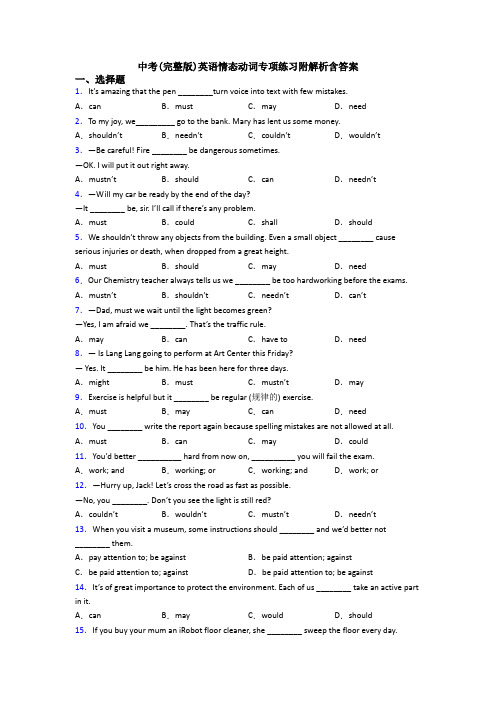
中考(完整版)英语情态动词专项练习附解析含答案一、选择题1.It’s amazing that the pen ________turn voice into text with few mistakes.A.can B.must C.may D.need2.To my joy, we_________ go to the bank. Mary has lent us some money.A.shouldn’t B.needn’t C.couldn’t D.wouldn’t3.—Be careful! Fire ________ be dangerous sometimes.—OK. I will put it out right away.A.mustn’t B.should C.can D.needn’t4.—Will my car be ready by the end of the day?—It ________ be, sir. I’ll call if there’s any problem.A.must B.could C.shall D.should5.We sh ouldn’t throw any objects from the building. Even a small object ________ cause serious injuries or death, when dropped from a great height.A.must B.should C.may D.need6.Our Chemistry teacher always tells us we ________ be too hardworking before the exams. A.mustn’t B.shouldn’t C.needn’t D.can’t 7.—Dad, must we wait until the light becomes green?—Yes, I am afraid we ________. That’s the traffic rule.A.may B.can C.have to D.need8.— Is Lang Lang going to perform at Art Center this Friday?— Yes. It ________ be him. He has been here for three days.A.might B.must C.mustn’t D.may 9.Exercise is helpful but it ________ be regular (规律的) exercise.A.must B.may C.can D.need10.You ________ write the report again because spelling mistakes are not allowed at all. A.must B.can C.may D.could11.You'd better __________ hard from now on, __________ you will fail the exam. A.work; and B.working; or C.working; and D.work; or 12.—Hurry up, Jack! Let’s cross the road as fast as possible.—No, you ________. Don’t you see t he light is still red?A.couldn’t B.wouldn’t C.mustn’t D.needn’t 13.When you visit a museum, some instructions should ________ and we’d better not________ them.A.pay attention to; be against B.be paid attention; againstC.be paid attention to; against D.be paid attention to; be against14.It’s of great importance to protect the environment. Each of us ________ take an active part in it.A.can B.may C.would D.should15.If you buy your mum an iRobot floor cleaner, she ________ sweep the floor every day.A.c an’t B.mustn’t C.needn’t D.shouldn’t 16.—Have you decided to take up teaching as career after graduation?—I ________ go abroad for further education instead. But it depends.A.must B.should C.may D.shall17.The boy is very brave.I ________ he ________ the tall tree.A.dare say; dares to climbB.dare to say; dare climbingC.dare saying; dares climbD.dare to say; dares climbed18.---Will you be back early this evening?---Yes, but I ________ be a little late. Our boss sometimes has extra work for us.A.may B.must C.need D.will19.We’ve discussed every detail of this plan and have got everything ready. But still something __________ go wrong. We still have to be very careful.A.must B.should C.would D.may 20.—Amy, I hear you've got many foreign coins._______ I have a look?—Of course, I'll fetch them for you.A.May B.MustC.Should D.Need21.My bike was broken yesterday,so I____walk home.A.might B.had to C.must D.could 22.—Would you please________in that way? That’s not safe!—Sorry. I won’t do it any more.A.not driving B.not to drive C.no driving D.not drive 23.Dr. Zhong Nanshan once said, "To prevent the spread of this disease, we________never be too careful."A.can B.may C.must D.should 24.Don’t cross the road until the traffic lights turn green. A car_______hit you.A.need B.may C.should D.must 25.—Where is Tom? I am considering ________ him about the result of the exam.—Oh. You ________. He has known it already.A.to tell; can't B.telling; needn't C.tell; mustn't D.told; shouldn't 26.You ________ pay too much attention to protecting yourself if you plan to go abroad. A.mustn’t B.can’t C.shouldn’t D.needn’t27.To avoid ________, we’d better ________ the parents’ meeting online.A.gather; hold B.gathering; hold C.gather; holding D.to gather; to hold 28.You ________ require others to do with the problem like you. Everyone has his own way. A.mustn’t B.needn’t C.may not D.shouldn’t 29.—How do you like my new dress?—Well, if I ________ say, it is not suitable for you.A.may B.must C.have to D.should 30.—Must the children leave at six tomorrow morning?—No, they _______. They can have more time to get ready for the trip.A.can’t B.needn’t C.mustn’t D.may not 31.—Mum, why do I have to wear a mask before entering the supermarket?—For your health and safety, you ________ be too careful.A.shouldn’t B.can’t C.mustn’t D.needn’t 32.According to the rule, used batteries ________ be dropped in the red bin for harmful wastes. A.may B.would C.should D.might33.You _________ smoke here! Look at the sign. It says "No smoking".A.needn't B.mustn't C.can D.may34.— Listen! Tom ________ be listening to the music while doing his homework.—Let’s go upstairs to remind him to turn it off.A.should B.could C.would D.must35.—Is that Mr Zhou?—It ________ be him. He has gone to Beijing.A.can B.may C.can’t D.shouldn’t 36.Never throw objects from the building. Even a small object ________ cause serious injuries, or death, when dropped from a great height.A.must B.should C.may D.need37.—The high school entrance examination is coming!— Yes, our teacher tells us we ________ be too careful while taking exams.A.mustn’t B.shouldn’t C.needn’t D.can’t38.— Is the boy over there Tom? He often wears a jacket like that.— It _______ be him. He is absent from school today.A.needn’t B.shou ldn’t C.mustn’t D.can’t39.—Is it really necessary for me to go shopping with a mask on?—I’m afraid you ________ in public. It is not only to protect yourself but also to protect others. A.must B.should C.can D.need40.Look at the floor, Tom! ________ you watch TV while having a meal?A.Should B.Could C.Must D.May41.Cars ________ give way to walkers on some roads in Binhai, or the drivers will be fined. A.may B.will C.can D.must 42.Sometimes smiles ________ be false, hiding other feelings like anger, fear or worry. A.should B.would C.must D.can43.—Could you tell me how to renew the library books?—With pleasure. You ________ come to our desk every time. It’s easier to renew them online. A.can’t B.mustn’t C.needn’t D.shouldn’t44.For the safety of the passengers, objects like guns ________ be carried on board.A.may not B.needn’t C.might not D.mustn’t 45.—The article says that a person’s animal sign decides his personality.—You ________ read it for fun, but don’t believe in that.A.can B.must C.shouldn’t D.needn’t 46.—How beautiful the winter jasmines (迎春花) are!—Yes. These golden-yellow flowers ________ be widely seen in my city in March.A.must B.can C.would D.should 47.—Mum, I bought some strawberries on my way home.—Oh, you’re so sweet. But the strawbe rries ________ be put into the fridge for freshness. A.must B.can C.may D.need48.— What do you think of the show yesterday?— Some of them were really good but others ________ be better.A.will B.must C.need D.can49.—May I have some wine to drink?—No, you ________. You have to drive home later.A.mustn’t B.needn’t C.can’t D.may not 50.—Will Jim come to Yangzhou for a holiday?—He ________come and it depends on how much homework he will have.A.may B.should C.must D.need【参考答案】***试卷处理标记,请不要删除一、选择题1.A解析:A【详解】句意:神奇的是,这支笔能把声音转换成文字,而且很少出错。
100例:初中九年级中考英语情态动词专项练习附答案
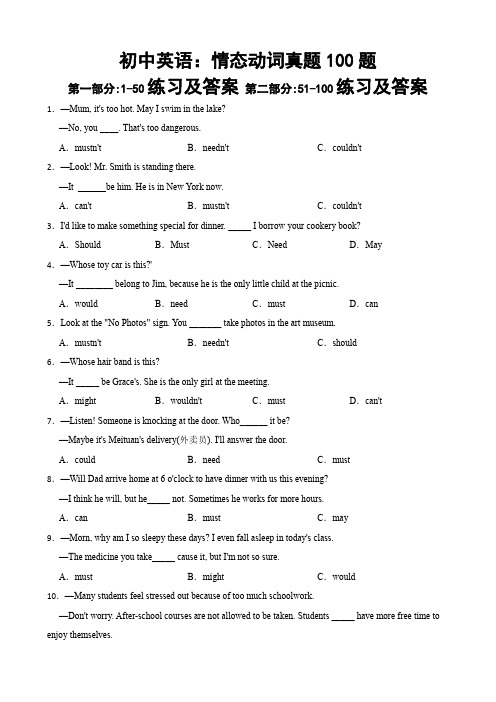
初中英语:情态动词真题100题第一部分:1-50练习及答案第二部分:51-100练习及答案1.—Mum, it's too hot. May I swim in the lake?—No, you ____. That's too dangerous.A.mustn't B.needn't C.couldn't2.—Look! Mr. Smith is standing there.—It be him. He is in New York now.A.can't B.mustn't C.couldn't3.I'd like to make something special for dinner. _____ I borrow your cookery book?A.Should B.Must C.Need D.May 4.—Whose toy car is this?'—It ________ belong to Jim, because he is the only little child at the picnic.A.would B.need C.must D.can5.Look at the "No Photos" sign. You _______ take photos in the art museum.A.mustn't B.needn't C.should6.—Whose hair band is this?—It _____ be Grace's. She is the only girl at the meeting.A.might B.wouldn't C.must D.can't7.—Listen! Someone is knocking at the door. Who______ it be?—Maybe it's Meituan's delivery(外卖员). I'll answer the door.A.could B.need C.must8.—Will Dad arrive home at 6 o'clock to have dinner with us this evening?—I think he will, but he_____ not. Sometimes he works for more hours.A.can B.must C.may9.—Morn, why am I so sleepy these days? I even fall asleep in today's class.—The medicine you take_____ cause it, but I'm not so sure.A.must B.might C.would10.—Many students feel stressed out because of too much schoolwork.—Don't worry. After-school courses are not allowed to be taken. Students _____ have more free time to enjoy themselves.A.can B.have to C.needed11.—A 14-year-old girl, Quan Hongchan, won at the 2020 Tokyo Olympics.—Nothing _____ without hard work. It took much effort for Quan to learn skills.A.can achieve B.will achieve C.will be achieved 12.—Where's Jack? His phone's out of service.—He_____ be on the ground floor. The phone can't get signal(信号) there.A.must B.can't C.might13.—Is it really necessary for me to go shopping with a mask(口罩)on?—I'm afraid you_____ in public. It's not only to protect yourself but also to protect others.A.should B.can C.must14.—_____ I have two tickets for the Chinese Farmers' Painting Exhibition?—Sorry. The tickets have been sold out.A.Must B.Need C.May15.—Who is playing the piano in the music room? Is it Mary?—No, it ___________be her. She has ___________to Beijing on business.A.couldn't; been B.can't; goneC.can't; been D.mustn't; gone16.—Whose physics book is this?—It _____be Helen's because her name is on it.A.mustn't B.must C.might D.can't 17.—David, do you know Su Yiming, a snowboarder from China?—Sure. He won the first place in the men's Big Air Event. He_____________ be hard-working.A.needn't B.can't C.should D.must 18.The boy ________ be Tom. I saw him reading in the library just now.A.shouldn't B.can't C.needn't19.— Mike, I can't stop playing computer games.— For your eyes, my dear friend, I'm afraid you____.A.could B.may C.would D.have to 20.—I can't find my dictionary. ________ I use yours?—Sure, here you are.A.Need B.May C.Must D.Should21.—_________ I take photos here?—Sorry, you can't. It's not allowed in the museum.A.Must B.Need C.Can D.Will22.To achieve our dream, we ________ rest on what we have done.A.may not B.should not C.need not D.could not23.—I don't care what Kate thinks.—Well, you _______. Her suggestions are of some value.A.would B.should C.might D.could 24.—Whose English book is this?—It _______ be Lily's, but I'm not sure.A.might B.can't C.must25.You ________ drive without a license!A.can B.must C.mustn't D.may26.When our parents become too old to take care of themselves one day, they __________ be looked after well by us.A.should B.shouldn't C.may D.may not 27.—Excuse me. _______ I sit here?—You'd better not. It's the man's seat.A.Must B.Need C.Could D.Should28.We should learn some basic life skills since we ________ depend on ourselves some day.A.can B.can't C.must D.mustn't 29.—Can we play games here?—Better not. If you ________, please go to the open space there.A.must B.can C.may D.will30.—The paper cutting is pretty lively, who made it?—It ________ be Amy. None of us except her is able to do it.A.would B.need C.must D.can31.— ________ you tell us a story in English?—I think I can do it. Let me try.A.Need B.Can C.Should D.Must32.—Look! Mark is reading a book in the library.—It ______ be him. He is in the classroom.A.can't B.wouldn't C.needn't33.—Listen! I think it ________ be Mrs. Li singing in the next room.— It ________ be her. I know she has already left for New York.A.may, must B.must, can't C.must, mustn't 34.—Whose is this toy truck?—It _________ belong to Dick. He was the only little kid at the picnic.A.can't B.must C.could D.need 35.—What kind of music do you like?—I like music that I ______ dance to.A.can B.must C.should D.need 36.—Alex, come down to play football.—I can't. Mom said I __________ clean my bedroom before doing anything else.A.had to B.will C.used to D.can37.The book ______ be Mary's. We can see her name on it.A.need B.must C.can't D.needn't 38.—To make our school more beautiful, we _____throw the rubbish on the ground.—Everyone should play an important part in doing it.A.needn't B.mustn't C.may not39.Jim can swim, but I________.A.don't B.can't C.am not40.—Wow! Here is an offer of Tsinghua University! _______it be Bob's?—It must be Bob's, he is the most excellent student in our school.A.May B.Can C.Must D.Shall41.You ________ pay too much attention to your reading skill as it's very important.A.shouldn't B.needn't C.mustn't D.can't 42.—Have you decided how to spend this weekend with your family, Lingling?—Not yet. We ____ go camping along Nanxi River to enjoy beautiful sights.A.must B.should C.need D.may43.— No one knows what it will be like tomorrow because there are many possibilities such diseases, disasters(灾难) and so on.— Yeah, but sometimes the facts show that humans stronger than the forces of nature.A.can't be B.can be C.mustn't be 44.The girl in the classroom ____ be Maria. She called me from the library just now.A.mustn't B.may not C.can't D.needn't 45.—Could you tell me how to renew the library books?一With pleasure. You________ come to our desk every time. It's easier to renew them online.A.can't B.mustn't C.shouldn't D.needn't 46.—Mom, can I watch TV this evening?—You ________ finish your homework first.A.can B.may C.must D.shall 47.— Whose toy car is this?—It be Sally's. She's the only little kid at the dinner party.A.should B.must C.might D.can't 48.—A country has dreams. We teenagers also have dreams.—With dreams and hard work, anything amazing can be created.A.should B.may C.must D.can 49.—Is that Li Ming over there?—It___ be him. He is working as a volunteer in Henan.A.can't B.mustn't C.must 50.—Some Chinese scientist are now doing research on sea rice.—If farmers__________ start planting rice in salty water, Chinese food supply will surely rise.A.can B.can't C.must D.mustn't答案解析部分1.A2.A3.D4.C5.A6.C7.A8.C9.B10.A11.C12.A13.C14.C15.B16.B17.D18.B19.D20.B21.C22.B23.B24.A25.C 26.A 27.C 28.C 29.A 30.C 31.B 32.A 33.B 34.B 35.A 36.A 37.B 38.B 39.B 40.C 41.D 42.D 43.A 44.C 45.D 46.C 47.B 48.A 49.A 50.A第二部分:51-100练习及答案1.—Someone is knocking at the door. Maybe Peter has come.—It be Peter because he has gone to New Zealand.A.can't B.may C.mustn't D.shall 2.—Mr. Wang, must I come again to clean the classroom on Sunday?—No, you . I have asked Kate to do it.A.can't B.mustn't C.needn't D.shouldn't 3.—________I return the book today, Mr. Lin?—No, you ________. You can keep it for two days.A.May; mustn't B.Must; mustn'tC.Must; needn't D.Can; shouldn't4.—Do you have any plans for the coming summer holidays?—I take part in some volunteering activities. I haven't decided.A.need B.may C.must D.could 5.—Must I go to Nanyang Square this afternoon to see him?— No, you . You can wait for his call.A.mustn't B.can't C.needn't D.shouldn't 6.—Jack must be in his office, I think.—No, he be in the office. He flew to Canada this morning.A.needn't B.shouldn't C.can't D.mustn't 7.— Is it Jay who didn't hand in the history homework this morning?— No, it ________ be Jay. History is his favourite subject.A.can't B.needn't C.shouldn't D.mustn't 8.—Tom, we play King of Glory(王者荣耀) together this weekend?—I'm afraid not. There is too much homework to do. We finish it on time.A.shall; can't B.may; must C.shall; should D.can; will 9.—Must I go to medical school and be a doctor like you, Dad?—No, you ________, son. You're free to make your own decision.A.can't B.shouldn't C.needn't D.mustn't 10.—Life is becoming convenient with the Internet.—That's true! Almost everything ______ be done online.11.—Dad, I've signed for the box. What's in it?—I'm not sure. It _____ be a present from your uncle.A.need B.must C.may D.will 12.—Sixty dollars for such a T-shirt! You be joking!—I'm serious. It's made of silk from Hangzhou.A.must B.need C.will D.can 13.— Mum, may I go swimming now?—Yes, dear, but remember that you ___________go with your dad.A.may B.can C.must D.should 14.—Could I invite my friends to our party on Sunday, mom?—Of course you _____. That sounds great.A.may B.can C.could D.must 15.— Hi, Tom! Is this new red bike Tim's? He told me he bought a new one.— It _______ be Tim's. He never buys things in red.A.can B.must C.can't D.mustn't 16.I love the weekend because I _______ get up early to go to school.A.can't B.mustn't C.needn't D.shouldn't 17.—Look! It _____ be John on the playground.—It_____ be him. I saw him in the classroom just now.A.may, mustn't B.must, can't C.can can't D.mustn't, can 18.—Mum, must I finish my homework today?—________. You may do it tomorrow morning.A.No, you mustn't B.No, you needn't C.Yes, you must 19.—I missed last night's Everlasting Classics(《经典咏流传》)!—You care. You can watch it online later.A.mustn't B.can't C.may not D.needn't 20.He _________ work on the farm every day. I'm sure about that because his skin is very black.A.can't B.may C.must D.couldn't 21.— Mom, I eat the sandwiches now ?— No. You must set the table first.22.— Mom, must I wash the clothes now?— No, you . You wash them in the afternoon.A.mustn't; must B.needn't; must C.mustn't; can D.needn't; can 23.—Whose is the notebook?—It ________ be Mary's. Look at her name on the cover.A.can B.may C.must D.need24.—Why don't you stay a little longer?—Sorry, I . I have to meet my uncle at the airport.A.must B.should C.needn't D.can't 25.Parents encourage their children to take part in volunteer work. It will have a good influence on themA.should B.mustn't C.might D.can't 26.—Listen! Is Millie playing the violin in the music room?—No. It be her. She has gone to the teachers' office.A.should B.must C.needn't D.can't27.You be tired after walking for such a long time. Sit down and have a rest.A.can B.can't C.mustn't D.must28.—Look! Is the man wearing a white shirt your father?—No, it ________be him. He is picking up my sister at the airport.A.may B.must C.can't D.mustn't29.—________ you leave now? You only arrived here an hour ago.—Sorry, but so much homework is waiting for me.A.May B.Must C.Can D.Might30.The magazines on the bookshelf are free for students. You keep one if you like.A.need B.must C.can D.should 31.Children under 12 years of age in that country go together with their parents when in a public library.A.must B.may C.can D.need32.—Who it be that is knocking at the door?—It be father, but I'm not sure.A.call; must B.can; may C.must; can D.may; must 33.—Lucy doesn't mind lending you her bike.—She , I've already borrowed one.A.can't B.mustn't C.needn't D.shouldn't 34.—Is there a flight to Paris this evening?—There be. I'll phone the airport and find it out.A.must B.would C.might D.can 35.—Must I stay here with you?—No, you . You may go home, but you go to the net bar(网吧).A.mustn't; needn't B.needn't; mustn'tC.must; need D.need; must36.—It's so late. Our son be back!—Don't worry. I dare say he have some extra work to do.A.can; must B.will; might C.should; must D.must; may 37.Marie witnessed everything but it is amazing that she have say nothing about the murder.A.can B.may C.must D.should 38.—Listen! Someone is singing in the next room. Who it be? Is it Linda?—No, it be her. She is at school now.A.may, can't B.must, mustn't C.will, may not D.may, won't 39.I'm feeling much better now so you ______ call the doctor.A.couldn't B.wouldn't C.can't D.needn't 40.—I'm a little tired. Let's go shopping by taxi.—We ______take a taxi. It's not far from here.A.mustn't B.couldn't C.needn't D.can't41.If you study harder, you will______ go to college.A.be able B.can C.be able to D.able to 42.When traffic lights are red, we stop and wait.A.should B.must C.need D.can 43.—Joe, what are you looking for?—My model plane. I ________ find it because it is a gift from my dearest grandpa.A.would B.must C.could D.can44.—What are you doing this weekend?—I'm not sure, but I ________go to Daming Lake.A.might B.must C.should D.need 45.— ____ I play computer games now, Mom?— No. You ______. You have to finish your homework first.A.May; mustn't B.Can; couldn't C.May; could D.Can; may not 46.— Someone is knocking at the door. Is it Ann? I've been waiting for her so long.—I'm sorry, it _____ be her. I saw her staying at school half an hour ago.A.may not B.shouldn't C.can't D.mustn't 47.— Excuse me, could you help me check if _________ tomorrow?— Ok. If you _____.A.the game will take place; mustB.the game is going to take place; needC.the game takes place; shouldD.the game is taking place; must48.—Marcus, could I have a look at your new mobile phone?—Of course you . Here you are.A.may B.could C.must D.can 49.—Can't you stay a little longer?—It's getting late I go now. My daughter is home alone。
中考英语情态动词知识点归纳 及答案含答案
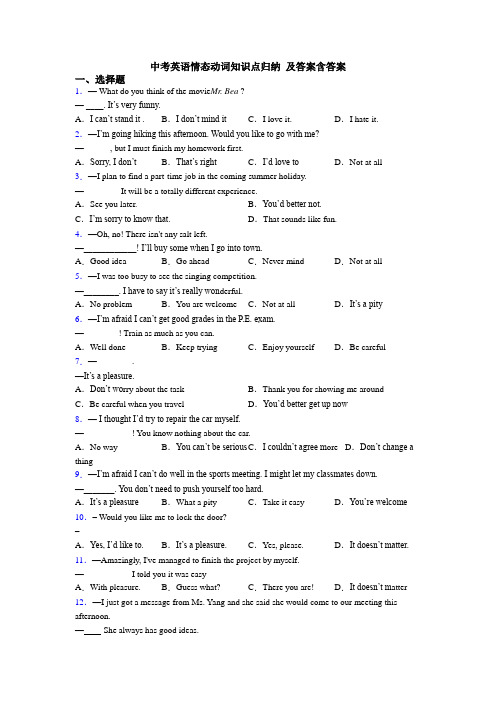
中考英语情态动词知识点归纳及答案含答案一、选择题1.— What do you think of the movie Mr. Bea ?—____. It’s very funny.A.I can’t stand it .B.I don’t mind it C.I love it. D.I hate it. 2.—I’m going hiking this afternoon. Would you like to go with me?—______, but I must finish my homework first.A.Sorry, I don’t B.That’s right C.I’d love to D.Not at all3.—I plan to find a part-time job in the coming summer holiday.—________ It will be a totally different experience.A.See you later. B.You’d better not.C.I’m sorry to know that.D.That sounds like fun.4.—Oh, no! There isn't any salt left.—____________! I’ll buy some when I go into town.A.Good idea B.Go ahead C.Never mind D.Not at all5.—I was too busy to see the singing competition.—________. I have to say it’s really won derful.A.No problem B.You are welcome C.Not at all D.It’s a pity 6.—I’m afraid I can’t get good grades in the P.E. exam.—________! Train as much as you can.A.Well done B.Keep trying C.Enjoy yourself D.Be careful 7.—________.—It’s a pleasure.A.Don’t wo rry about the task B.Thank you for showing me aroundC.Be careful when you travel D.You’d better get up now8.—I thought I’d try to repair the car myself.— __________ ! You know nothing about the car.A.No way B.You can’t be serious C.I couldn’t agree m ore D.Don’t change a thing9.—I’m afraid I can’t do well in the sports meeting. I might let my classmates down.—_______. You don’t need to push yourself too hard.A.It’s a pleasure B.What a pity C.Take it easy D.You’re welcome 10.– Would you like me to lock the door?– _______A.Yes, I’d like to.B.It’s a pleasure.C.Yes, please. D.It doesn’t matter. 11.—Amazingly, I've managed to finish the project by myself.—___________I told you it was easyA.With pleasure. B.Guess what? C.There you are! D.It doesn’t m atter 12.—I just got a message from Ms. Yang and she said she would come to our meeting this afternoon.— She always has good ideas.A.Why not? B.What a pity! C.Time is up. D.That’ll be very nice. 13.—I prefer western food. It’s delicious and goo d for us.—_______ ? But western food is said to be high in sugar and fat.A.Is that right B.How do you know thatC.Do you really think so D.Who told you that14.—Can I look at the menu for a few more minutes before I decide?—Of course. ________, Sir.A.Make yourself at home B.Enjoy yourself C.It doesn’t matterD.Take your time15.—Would you like a small or a large bowl of noodles? —_______. I’m very hungry.A.A small bowl B.A large bowl C.Yes, please D.No, thanks16.-Do you mind telling me how to use this function? - . It’s easy. Just double-click on the “Pencil” icon.A.No, not at all B.Of course, I doC.Yes, I do D.Yes, I don’t17.—Would you please help me with my spoken English?—__________. First you should know practice makes perfect.A.That’s r ight B.No problem C.Quite well D.No, thanks 18.—Lucy, can you help me with my history?—________. I am good at it.A.With pleasure B.I’m afraid not C.Sorry, I can’t D.No way 19.—Sir, this is your order, two chicken hamburgers and a cup of coffee. ________—I’ll have them here.A.For here or to go? B.Something to drink? C.Anything else? D.Is that OK? 20.—I missed the basketball game last Saturday because I had an exam.—________, but it will be repeated on TV.A.Take it easy B.You are lucky C.That’s wonderf ul D.Never mind 21.—Why not take your son to watch the new film A Little Red Flower?—__________.A.Good idea B.No problem C.Good luck D.No way 22.—I’m sorry I didn’t make it to your birthday party last night.— ________ I know you are busy recently.A.Why not? B.Don’t mention it.C.No way. D.That’s all right. 23.—You seem so happy today, Jack.—________? I won the first prize in the singing competition yesterday.A.So what B.How come C.Guess what D.Why not 24.—Susan, will you please go and empty that drawer?— _________ ?A.What for B.What is it C.How is it D.How come25.--Would you like to go shopping with me on Saturday?-- . I have to help my mother with housework.A.I’m afraid not B.Take your timeC.Enjoy yourself D.That’s all right26.—Hi, everybody! Here is the music.—________. Let’s dance to the music.A.That’s no good B.Here we go C.That’s a shame D.Have a good time 27.—Can you tell me how to get to the park?—________—Thank you all the same.A.Show me the map, please.B.Certainly. It’s oppos ite the museum.C.Sorry, I don’t know. I’m a stranger here.D.Sure. Turn right and go along Rock Road.28.—All of Mark Twain’s novels are popular.— ________. Especially The Adventures of Tom Sawyer.A.I can’t agree more B.That’s not the case C.That’s not the point D.Don’t mention it 29.—Could you help me look after my baby ________ I am away?—________.A.as; With pleasure B.while; My pleasure C.as; That’s all right D.while; With pleasure30.—How would you like your soup?—________.A.Very delicious B.With some tomatoes and eggs, pleaseC.I like it very much D.No, thanks31.—Would you mind if I open the window?—_______.We need fresh air.A.Not at all B.Yes, of course C.You’d better not D.That’s all right 32.—I find it really unwise to go travelling during May Day holiday.—________! Wherever you go, it’s crowded with cars and people.A.Not exactly B.Forget it C.You said it D.It depends 33.—Only those who have a lot in common can get along well.—________ Opposites sometimes attract.A.I think so. B.I do n’t think so.C.I don’t care.D.I hope so. 34.—Only those who have a lot in common can get along well.—________. Opposites sometimes attract.A.I think so B.I don’t think so C.I don’t care D.I hope so 35.— Why will you take part in the charity walk? You are not good at running at all.— ________. I run to show that I can help others.A.Not exactly B.That’s not the point C.I can’t agree more D.It sounds like a pity 36.—Shall we go to the amusement park right away or the day after tomorrow?—________. Any time will do.A.Excuse me B.Have a good timeC.It’s up to you D.I’m afraid I can’t37.—Our family will go to Hangzhou for a holiday this summer.—________.A.Well done B.I am glad to hear thatC.Best wishes to you D.Have fun38.—Oh, my love, you say you have ordered a dozen cups of bubble tea (奶茶)?—________A.Agree. B.Forget it. C.I really do. D.Are you kidding me? 39.—Why don’t you join in a club to practise speaking English?—________.A.That’s a good idea B.Never mind C.Yes, please D.Thank you 40.— Mike, are you ready for the coming final exam?— ________. I have prepared it for weeks.A.You bet B.No deal C.Bad luck D.Have fun41.— Do you think Steve will pass the exam this time?— ________! He spends most of his time playing games on the phone.A.Promise B.No way C.Well done D.No problem 42.—How about putting some pictures into the report?—________ A picture is worth a thousand words.A.I don’t think so.B.Why not?C.Thank you. D.Don’t mention it.43.—Summer camping gives children the chance to live away from home.—________. It is always good to help children grow up.A.That’s true.B.Come this way. C.Let me have a look. D.I don’t think we agree.44.—Do you think you could finish this project without help?—________. This is not the first time for me.A.Take care B.Don’t worry C.Not exactly D.Hurry up 45.—Our school football team has won the first prize in the match!—________A.Have a good time. B.Nice work. C.Never mind. D.Good luck. 46.—We can invite Kate and Paul to Baohe Park with us.—________ I’ll give them a call right now.A.Why not? B.What for? C.What’s up?D.Are you kidding? 47.—We’ll study in different schools next term. I hope you’ll enjoy your time in the new school!—________A.I’ll take your advice. B.The same to you. C.Congratulations!D.It doesn’t matter.48.—Michael was late for Mr. Smith’s chemistry class this morning.—________? As far as I know, he never came late to class.A.So what B.Why not C.How come D.Who cares 49.— I guess you want to play tennis in the park this afternoon.—_______. That’s exactly what I was thinking just now.A.It’s up to you B.Of course not C.You read my mind D.It’s hard to say 50.— Mr. Smith, I won the first prize in the competition.—______ I think you’ll do better and better.A.Congratulations! B.Good idea! C.That’s all right!D.What a shame!【参考答案】***试卷处理标记,请不要删除一、选择题1.C【解析】本题考查日常用语。
语法专题八 情态动词【考点精讲精练】-2023年中考语法一点通(学生版)

考点精讲情态动词表示讲话人的态度、请求、许可、愿望、可能等。
本身具有一定的意义,但不能独立作谓语,没有人称和数的变化,且后面必须跟动词原形。
常考的情态动词有:can/could(能够,可以),may/might(可能,可以),must(必须,一定),should(应该),need(必要),have to(不得不)等。
Need用作情态动词时常用于否定句和疑问句,need还可作实意动词,常用结构need to do sth.考点1.情态动词+动原➢He can play the violin. 他会拉小提琴。
➢It might snow tomorrow. 明天可能下雪。
➢We should respect everyone. 我们应该尊重每一个人。
考点2.常考的一般疑问句的回答—Can you swim?—Yes, I can. /No, I can’t.—May I smoke here?—Yes, you may/can. /Sure. / Certainly. / Of course. /No, you mustn't / can’t.—Must we finish the work at once?—Yes,you must. /No,you needn't. / No,you don't have to.(must引导的一般疑问句的否定回答是常考点)考点3.must必须(强调主观看法)mustn’t表示禁止,不允许➢You must study harder this term. 你们这学期必须更加努力学习。
(说话者的个人看法)➢You mustn’t swim in the river. 你们千万不能去河里游泳。
(这条河禁止游泳)考点4.情态动词表推测表推测:由强到弱肯定:must 准是,一定can 可能could(可能)may (或许) might(大概)否定:can’t 不可能may/ might not 或许不能can 和could 表示推测,can 表示推测时,往往用于否定句和疑问句。
初中英语情态动词详细用法归纳含练习及答案

初中英情用法(含及答案)考点一: can, may , must等情在述句中的用法:1. can 的用法:( 1).表示能力、可、可能性。
表示能力一般“能、会”,即有种能力,特别是生来具的能力 .如: She can swim fast, but I can’能她t.游得很快,但我不可以。
I can see with my eyes. 我用眼睛看。
could 是 can 的去式。
表示去的能力。
be able to do sth. 经常指努力,花了和力以后才能做到某事。
is/am/are able to do sthwas/were able to do sth.(2) .表示可,常在口中。
如: You can use my dictionary.你能够用我的词典。
( 3).表示推,可能性,意“可能”,常用于否认句和疑句中,此can’t“ 不可以能”。
如:Can the news be true? 个信息会是真的?— Can it be our teacher?那个人有可能是我老?— No, it can ’t be our teacher. He is on a visit to the Great Wall不可以.能。
咱老正在游城呢。
【例】— I think Miss Gao must be in the library. She said she would go there.—No. She __be there, I have just been there. A.can ’ t B.mustn ’ tC.needn ’ tD.wouldn ’t【分析】依据下文“我去那边”可知,“ 不可以能”,can’t表示推[答案] A could 的用法:(1).can 的去式,意“能、会”,表示去的能力。
如:He could write poems when he was 10. 他十就会写。
( 2) . could 在疑句中,表示委宛的气,此could 没有去式的意思。
中考英语情态动词专题讲解与练习
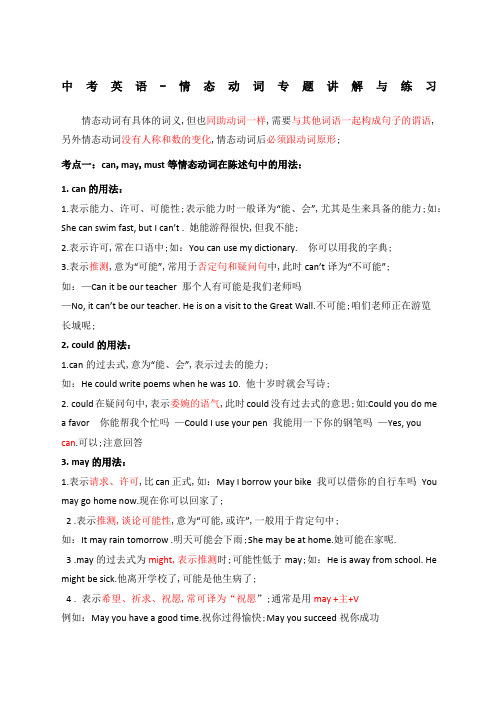
中考英语-情态动词专题讲解与练习情态动词有具体的词义,但也同助动词一样,需要与其他词语一起构成句子的谓语,另外情态动词没有人称和数的变化,情态动词后必须跟动词原形;考点一:can,may,must等情态动词在陈述句中的用法:1. can的用法:1.表示能力、许可、可能性;表示能力时一般译为“能、会”,尤其是生来具备的能力;如:She can swim fast, but I can’t . 她能游得很快,但我不能;2.表示许可,常在口语中;如:You can use my dictionary. 你可以用我的字典;3.表示推测,意为“可能”,常用于否定句和疑问句中,此时can’t译为“不可能”; 如:—Can it be our teacher 那个人有可能是我们老师吗—No, it can’t be our teacher. He is on a visit to the Great Wall.不可能;咱们老师正在游览长城呢;2. could的用法:1.can的过去式,意为“能、会”,表示过去的能力;如:He could write poems when he was 10. 他十岁时就会写诗;2. could在疑问句中,表示委婉的语气,此时could没有过去式的意思;如:Could you do mea favor 你能帮我个忙吗—Could I use your pen 我能用一下你的钢笔吗—Yes, you can.可以;注意回答3. may的用法:1.表示请求、许可,比can正式,如:May I borrow your bike 我可以借你的自行车吗You may go home now.现在你可以回家了;2 .表示推测,谈论可能性,意为“可能,或许”,一般用于肯定句中;如:It may rain tomorrow .明天可能会下雨;She may be at home.她可能在家呢.3 .may的过去式为might,表示推测时;可能性低于may;如:He is away from school. He might be sick.他离开学校了,可能是他生病了;4 . 表示希望、祈求、祝愿,常可译为“祝愿”;通常是用may +主+V例如:May you have a good time.祝你过得愉快;May you succeed祝你成功4. must的用法:1.must表示主观看法,意为“必须、一定”;如:You must stay here until I come back.在我回来之前你必须呆在这儿;2对must引导的疑问句,肯定回答为must,否定回答needn’t或don’t have to .如:Must I hand in my homework right now 我必须现在交作业吗 No,you needn’t.4must表示有把握的推测,用于肯定句;mustn't表示“禁止,不允许”如: The light is on, so he must be at home now.灯亮着,他现在肯定在家;5. need的用法:1.need表示需要、必须,主要用于否定句和疑问句中,,意为“没有必要,不必”; 如:—Need I stay here any longer 我还有必要留在这儿吗—Yes, you must .是的;—No. you needn’t /don’t have to.不,你不必;2.need还可以作实义动词,此时有人称、数和时态的变化,如果是人作主语后边多接动词不定式;如:I need to do it right now.我需要马上做这件事;He needs to learn more about the girl.他需要多了解那个女孩;如果是物作主语,一般用need doing与need to be done这种情况下应注意两点:①.主动形式的动名词doing具有被动的含义;②.该动名词可以改为其动词不定式的被动形式而句子的意义不变;如:. The door needs painting. = The door needs to be painted.那扇门需要油漆一下;need的用法的助记口诀:实义动词表“需要”,后接名、代、不定式;need后接动名词,主动形式表被动;情态动词表“需要”,没有人称数之变;其后直接加动原,多用疑问与否定;7. shall的用法:shall表示征求对方意见多用于第一、三人称,如:Shall we go out for a walk 我们出去散步好吗在英语中,我们可以用其他多种方式提出我们的建议或征求对方意见;1.用“Let's do...”来提出建议;如:Let's go for a walk after supper.2.用“What/How about... ”来提出建议;about后接名词或动词ing形式;如:What about/How about a drink What about/How about taking Tom with us3.用“Why not... ”来提出建议,表示“何不……”not面后接动词原形;“Why not... ”实际上是“Why don't you/we... ”的简略形式;如:Why not meet at the school gate at eight Why don't we stay here another day4.用“Would you like... ”来提出建议,意思是“你想要……吗”Would you like后可接名词或不定式;如:Would you like a cup of tea Would you like to go and see her 因此,如果我们说:“去游泳好吗”英语中可有这样几种表达法:Shall we go for a swim Let's go for a swim,shall we What about/How about going swimming Why not go for a swim Would you like to go for a swim What do you think of going for a swim8. should的用法:1.should意为“应该”,可表示劝告、建议、义务、责任等;如:We should protect the environment.我们应该保护环境;(2)Should have done表示对过去动作的责备、批评;如:You should have finished your homework.你应该已经完成作业了;事实上你没有完成;3be supposed to do=should do, ought to 可以代替should,语气更强烈些;9. will的用法:will表示意愿、意志、打算,可用于多种人称;如:I will help you if I’m free this afternoon.今天下午如果我有空,我就会帮你;注意:1、will在there be句型中的形式及其句式变换;there be句型的一般将来时的形式就是there will be;一定不能说there will have例如:There are many students in our school.→There will be many students in our school. There will beis going to be a sports meeting next week.一定不能说:There will have a sports meeting next week.2、will与be going to区别:①. be going to表示近期、眼下就要发生的事情,will表示的将来时间则较远一些,如:He is going to write a letter tonight. He will write a book one day.②. be going to表示根据主观判断将来肯定发生的事情,will表示客观上将来势必发生的事情;He is seriously ill. He is going to die. He will be twenty years old.③. be going to含有“计划,准备”的意思,而will则没有这个意思,如:She is going to lend us her book. He will be here in half an hour.④.在有条件从句的主句中,一般不用be going to,而多用will,如:If any beasts comes at you, I'll stay with you and help you.10. had better的用法:had better意为“最好”,没有人称的变化,后面接不带to的不定式,其否定形式为:had better not+动原;如:We had better go now.我们最好现在就走;You’d better not give the book to him.你最好不要把这本书给他;考点二:含有情态动词的疑问句的回答:1.对may引出的问句,可以有下列回答方式:Yes,you may. Yes, of course. No, you can’t.2.对must引出的疑问句,回答方式为:Yes, …must. No,…don’t have to.3.could在疑问句中,表示委婉的语气,此时could没有过去式的意思;—Could I use your pen 我能用一下你的钢笔吗—Yes, you can.可以;注意回答4. shall引出的疑问句用于第一人称,表示征求对方意见或客气的请求;其回答方式有以下几种:Yes, please.All right.No, thank you.5.would you…的回答方式有以下几种:Yes, I will. No, I won’t.All right/ OK/ With pleasure.Certainly. No, thank you .Yes, please.考点三:不同情态动词的否定意义也不同:1.1.can’t可译为“不会”,如:I can’t play basketball.我不会打篮球;2当句子表推测时,用can’t表达不可能,如:He can’t be ill. He is playing chess with Tom.他不可能病了,他正和Tom下棋呢;3can’t还可用来回答“ May I … ”这样的问句;如:May I come in 我可以进来吗No, you can’t.不,你不能;4can’t还可用于固定习语中;can’t help doing禁不住,情不自禁can’t wait to do something迫不及待地要做…如:She can’t help crying.她禁不住大哭起来;The children can’t wait to open the box.孩子们迫不及待地想打开盒子;2.may的否定式为may not,译成“可能不”,如:He may not be at home.他也许不在家;3.mustn't 不表示推测,而表示禁止;意义为“禁止,不允许”-- May I park my car here --No,you mustn’t.考点四:情态动词的被动语态含有情态动词的被动语态的结构为:情态动词+ be + done 动词的过去分词;做题时要兼顾情态动词和被动语态这两个方面;More and more trees must be planted in China.在中国必须种植更多的树木;Many of the stars can not be seen because they are far away from us.很多星星我们都看不到,因为它们离我们太远了;考点五:情态动词表示推测的用法:一、“情态动词+动词原形”表示对现在的推测;1、can表示推测时一般用于否定句或疑问句;如:That man can't be her husband. She is still single.Who is knocking at the door Can it be the postman2、must表示肯定的推测,一般用于肯定句中;如:He must be in his office now.Mr Li must be working now,for the lights in his office are still on.3、might表示推测时不一定是may的过去时,只是表示其可能性较may小; 如:—Where is Mr Li —He might be working in his office.—May Mr Li come —He might not come here.4、must,may,might/could都可以在肯定句中表“可能”;其中must的语气最强,可能性最大,其余依次递减;否定句用can’t.情态动词易混点归纳易混点一: can和be able to:两者表示能力时用法相同,但can只有原形“can”和过去式“could”两种形式,在其他时态中要用be able to来表示;另外be able to常常指经过努力,花费了时间和劳力之后才能做到某事;如:Jim can’t speak English.吉姆不会说英语;He could speak English at 5.他五岁时就会说英语;We’ll be able to see him next week.下星期我们将会见到他;He has been able to drive.他已经会开车了;I’m sure you’ll be able to finish it quickly.我相信你能迅速地完成;We were able to reach the top of the mountain at noon.我们能在中午到达山顶;易混点二:can和may1.can和may均可用来征求意见或许可,意为“可以”,一般可互换使用;如:Can/ May I help you 我能帮助你吗2. can和may表示可能性时的区别:1在肯定句中用might,may,must,不用can2在疑问句,否定句中用can,can’t不可能,不用may,must;如:She may be in the classroom .她可能在教室里;Where can they be now 他们现在可能在哪儿That can’t be true.那不可能是真的;易混点三: may be和maybe用法区别常用位置may be may为情态动词,be为动词原形句中,作谓语maybe 副词,大概、也许,相当于perhaps 句首,作状语例如:He may be wrong , but I’m not sure.也许他错了,但我也不确定;Maybe he is wrong.情态动词练习题1. Mr Wang ______ be in Nanjing now, he went to Beijing only this morning.A. mustn’tB. may notC. can’tD. needn’t2. –Must I stay at home, Mum --No, you ______.A. needn’tB. mustn’tC. don’tD. may not3. –Can you go swimming with us this afternoon--Sorry, I can’t. I _____ take care of my little sister at home because my mother is ill.A. canB. mayC. wouldD. have to4. –May I go to the cinema, Mum --Certainly. But you ______ be back by 11o’clock.A. canB. mayC. mustD. need5. To make our city more beautiful, rubbish ______ into the river.A. needn’t be thrownB. mustn’t be thrownC. can’t throwD. may not throw6. –May I go out to play basketball, Dad--No, you ______. You must finish your homework first.A. mustn’tB. may notC. couldn’tD. needn’t7. –Where is Jack, please --He _____ be in the reading room.A. canB. needC. wouldD. must8. –Who is the man over there Is it Mr Li--No, it ______ be him. Mr Li is much taller.A. musn’tB. may notC. can’tD. needn’t9. These books ______ out of the reading room. You have to read them here.A. can’t takeB. must be takenC. can takeD. mustn’t be taken10. –Must we hand in the papers now --No, you ______.A. can’tB. may notC. mustn’tD. needn’t11. John ______ go there with us tonight, but he isn’t very sure about it.A. mustB. canC. willD. may12. –May I stop here --No, you ______.A. mustn’tB. might notC. needn’tD. won’t13. –Could I borrow your dictionary -- Yes, of course you _______.A. mightB. willC. canD. should14. –Shall I tell John about the bad news--No, you ______. I think that will make him sad.A. needn’tB. wouldn’tC. shouldn’tD. mustn’t15. –Someone is knocking at the door. Who ______ it be--It ______ be Tom. He is still in the school.A. can; can’tB. can; mustn’tC. might; couldD. might; may16. I need ______ a new cellphone,for the old one needs______ .A. buy; to repairB. buy; repairedC. to buy; repairingD. buying; repair。
初中英语中考情态动词考点及练习

情态动词情态动词又叫情态助动词;它们具有以下特点:⑴它们必须与其他动词连用,即:情态动词+动词原形表示说话人对所述动作的看法,如需要、可能、意愿或怀疑等;⑵绝大多数情态动词没有人称和数的变化,即第三人称单数不加-s以be和have 开头的情态动词短语除外;⑶在意义上,情态动词具有“多义性”;例:can既可表示能力,又可表示可能、允许等意义;情态动词的基本用法1. can的基本用法:⑴表示体力或智力上的能力,即“能够,会”,可与be able to转换;例:He can speak English. = He is able to speak English.—Can you play basketball— No, I can’t.如果表示将来具备的能力,要用will be able to;例:If I have a good sleep, I will be able to do the problem.⑵表示许可,主要用于口语,书面语一般用may;例:—Can we go home now, please— No, you can’t.You can only smoke in this room.You can’t keep the library books for more than a month.⑶表示“可能”,与may同义,但一般用在疑问句中;例:What can he possibly want在否定句中,否定形式can’t表示推测“不大可能”;例:Anybody can make mistakes.The news can’t be true.与第一、二人称连用时,还可以就可能的解决问题的方式或可能的行为提出建议;在这里,也可用could使语气婉转;例:Can / Could we meet again next week 下周我们可以再见面吗—What shall we do 我们怎么办呢— We can / could try asking Lucy for help.——我们可以请露茜帮忙试试看;You can / could help me with the cooking. 你可以帮我做饭;2. may的基本用法:⑴表示“许可”,用can比较口语化;例:You may / can come if you wish. 如果你想来,你就来;You may not pick flowers in this park. 本公园内不许摘花;may not表示按规定不许可,如果用mustn’t则表示说话人不许可;我可以在这里抽烟吗—;mustn’t表示明确的禁止;⑵;例:It may rain tomorrow. 明天可能会下雨;;注意:如果,通常用例:那会是真的吗他究竟是谁呢⑶注意—Yes, you —No3. must的基本用法:⑴表示必须,强调说话人的主观意志;例:I must go now, or I’ll be late.You must be here by注意:表示“必须“时,must的否定式为或而不是mustn’t;也就是:—Must—Yes, you—No, you例:——No, you .⑵表示推测,一般只用于肯定陈述句,表示非常肯定;例:She didn’t look at me. She must be angry. 她不朝我看,一定是生气了;He is good at English. He must know the word. 他英语好,准知道这个词;You must be Mr. Jones. 想必您就是琼斯先生吧;4. have to的基本用法:have to可视为情态动词,但它与其他情态动词在用法上稍有不同;其他情态动词没有人称和数的变化,而have to却有人称和数的变化,要视主语的不同而变化;例:I / You / We / They have to….He / She / It has to….You don’t have to….意思是“必须,不得不”;have to强调客观需要;例:Sorry, I have to leave now. 对不起,现在我得走了;I’ve got to go to a meeting. 我得去参加一个会议;Will he have to work deep into the night 他将不得不工作到深夜吗5. need的基本用法:need的基本词义是“需要”,它既可作情态动词,又可作实义动词;⑴ need用作情态动词时,只用于否定句和疑问句;它只有一种形式,后接动词原形;例:I don’t believe you need worry. 我相信你没有必要焦急;—Need we go so soon我们需要这么早就去吗— Yes, we must. / No, we needn’t.是的,必须;/不,不必;So I needn’t tell him, need I 所以我不需要告诉他,对吧请比较以下两句话的不同意思:You needn’t buy the coat. 你没有必要买那件外衣;你还没买You needn’t have bought the coat. 你没有必要买这件外衣的;而你⑵My watch needs mending/to be mended. 我的手表需要修理了;We don’t need to work today. = We needn’t work today.Does he need to go right now = Need he go right now6. had better的基本用法:had bette r常略作’d better;现代语法认为它是一个助动词,因为它后接不意思是“最好做某事;还是做某事比较好”;get some sleep. 你最好睡一会儿;You’d better not do that again. 你最好别再做那件事;What had we better do now 我们现在怎么做才好呢, should, would, might表示推测:①.must多用于肯定句中表示把握性极大的推测,意思为“一定、肯定”;如: You have worked hard all day. You must be tired. 你已辛苦工作一整天了,一定累了;The book must be his. His name is on the cover. 这本书一定是他的,封面上写着他的名字;注意 must不表推测时,在肯定句中意思为“必须强调内在的职责”,在否定句中意思为“不许、禁止”,以它开头的疑问句否定回答常用needn’t或don’t doesn’t have to;如:We must obey the traffic rules. 我们必须遵守交通规则;Cars mustn’t be parked here. 此处严禁停车;—Must we hand in the papers this week 我们必须本星期交论文吗—No, you needn’t. 不,你们不必本星期交;②. can / could多用于否定句、疑问句或间上没有差别;用can时不相信的程度更强一些,如:The man under the tree can’t be Tom人不可能是Tom,他已经去英国了;Can it be true that he was fooled by a five-year-old boy 他被一个五岁的孩子愚弄了,这能是真的吗Could this be an excuse 这会不会是个借口How can you be so careless 你怎么这样粗心③.may / might多用来表示把握性不大的推测,意思为“也许、可能”, might比;注意区分“不可能”与“可能;如:Mr. Wang may know Professor Li’s telephone number.王先生也许知道李教授的电话号码;This might be the key Tom has been looking for.这可能就是汤姆一直在找的钥匙;She may not be there today. 今天她可能不在那儿;一、典型例题中考链接1.—Who is the man over there Is it Mr. Li— No, it ______ be him. Mr. Li is much taller.A. mustn’tB. may noC. can’tD. needn’t2.—Must I go with them tomorrow— No,you ______.A. mustn'tB. shouldn'tC. needn'tD. can't3.—______ I take some photos in the hall— No, you ______.A. Can, needn’tB. Must, mustn’tC. Could, won’tD. May, m ustn’t4.—Dad, must I finish my homework today—No, you ________. You may do it tomorrow.A. needn’tB. mustn’tC. don’tD. won’t5.—The lake is said to be dry. Is that true—It , some kids are swimming in it.A. must be trueB. can’t be trueC. may not be true6.—What is your mother going to do this Saturday—I’m not sure. She _____ go to see my grandmother.A. canB. mustC. may7.—Susan has bought a large house with a swimming pool.—It ______ be very expensive. I never even dream about it.A. mustB. mightC. can’tD. shouldn’t8.—Listen Is Professor Johnson giving a report in the hall —No, it be him. He has gone to Japan.A. needn’tB. may notC. mustn’tD. can’t9.—Let’s go to the West Hill Park by taxi.—Oh, it is not far away from here. We _______take a taxi.A. couldn’tB. mustn’tC. needn’tD. can’t10.—Can you play the piano—Yes, I _______. I often practice it on weekends.A. needn’tB. needC. can’tD. can三、课后练习一、用can, may, must, need, have to, had better的适当形式填空:1.You ________________ return the library book on time.2.I ______________ not find the way to the hospital. _______________ youshow me the way3.—________________ I finish the work right now— No, you ________________ not. You ____________ do it later.4.He said he ________________ not come tonight.5.Her mother was ill. She ________________ stay at home and look afterher.6.It’s time for class. You ________________ stop playing football oryou __________be late for class.7.We ________________ start right now, or they would get there first.8.The cloud is lifting, so it ________________ not be a rainy daytomorrow.二、选择填空1.—Do we have to finish our homework this afternoon—Yes, you ________.A. mustB. canC. mayD. need2. —Must I be in hospital for a week, Doctor—No, you . You can go back home tomorrow.’t B.needn’t C. must3. The desk is not dirty. You _______clean it.A. mustn’tB. shouldn’tC. needn’t C. can’t4. —May I watch TV for a while—No, you _______. You have to finish your homework first.A. shouldn’tB. needn’tC. mustn’tD.won’t5.—Is Jessica giving us a speech this evening—No, it ________be her. She________ to Japan.A. mustn’t; has goneB. mustn’t ;has beenC. can’t ;hasgone D. can’t ;has been6. It’s the library So you________ know shouting is no t allowed here.A. canB. mustC. needD. may7. Boys and girls, don’t forget your report . It ______ today.A. can’t finishB. can’t be finishedC. should finishD. should be finished8.—Mr Smith must have been to your home this morning.—No, he ______ ,because he didn’t know my address.A. couldn’tB. can’tC. mustn’tD. may not9. —Must I mop up the window now—No, you________.’t B. can’t C. shouldn’t D. mustn’t10. —Is Lucy knocking at the door—No. It ________ be Lucy. She is in Japan now.A. needn’tB. mustC. can’t11. —Another cup of coffee—No, thanks. I _____ be off. Mary is waiting for me.A. canB. mayC. mustD. might12. —I’m a little tired. Let’s go to t he zoo by taxi.—We take a taxi. It’s not far from here.A. can’tB. mustn’tC. couldn’tD.needn’t13. If the traffic light is red, you ________ cross the road. It’s very dangerous.A. don’tB. mustn’tC. needn’tD.wouldn’t14. —Must I finish watering the flowers now—No, you________.A. mustB. won’tC. needn’tD. can’t15. —I can’t give up smoking, doctor.—For your health, I’m afraid you ________.A. mayB. canC. have toD. must。
人教版中考英语专项训练情态动词专题(含答案)
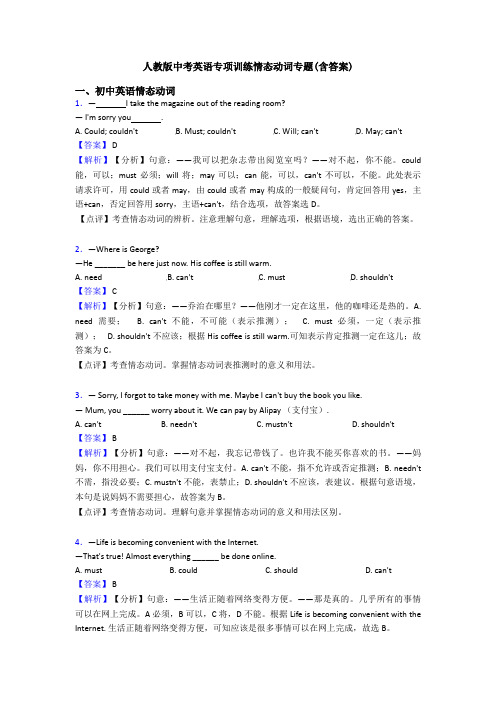
人教版中考英语专项训练情态动词专题(含答案)一、初中英语情态动词1.— I take the magazine out of the reading room?— I'm sorry you .A. Could; couldn'tB. Must; couldn'tC. Will; can'tD. May; can't【答案】 D【解析】【分析】句意:——我可以把杂志带出阅览室吗?——对不起,你不能。
could 能,可以;must必须;will将;may可以;can能,可以,can't不可以,不能。
此处表示请求许可,用could或者may,由could或者may构成的一般疑问句,肯定回答用yes,主语+can,否定回答用sorry,主语+can't,结合选项,故答案选D。
【点评】考查情态动词的辨析。
注意理解句意,理解选项,根据语境,选出正确的答案。
2.—Where is George?—He _______ be here just now. His coffee is still warm.A. needB. can'tC. mustD. shouldn't【答案】 C【解析】【分析】句意:——乔治在哪里?——他刚才一定在这里,他的咖啡还是热的。
A. need需要; B. can't 不能,不可能(表示推测); C. must 必须,一定(表示推测); D. shouldn't不应该;根据His coffee is still warm.可知表示肯定推测一定在这儿;故答案为C。
【点评】考查情态动词。
掌握情态动词表推测时的意义和用法。
3.— Sorry, I forgot to take money with me. Maybe I can't buy the book you like.— Mum, you ______ worry about it. We can pay by Alipay (支付宝).A. can'tB. needn'tC. mustn'tD. shouldn't【答案】 B【解析】【分析】句意:——对不起,我忘记带钱了。
初中情态动词专题汇总复习:知识点总结 习题(含答案)
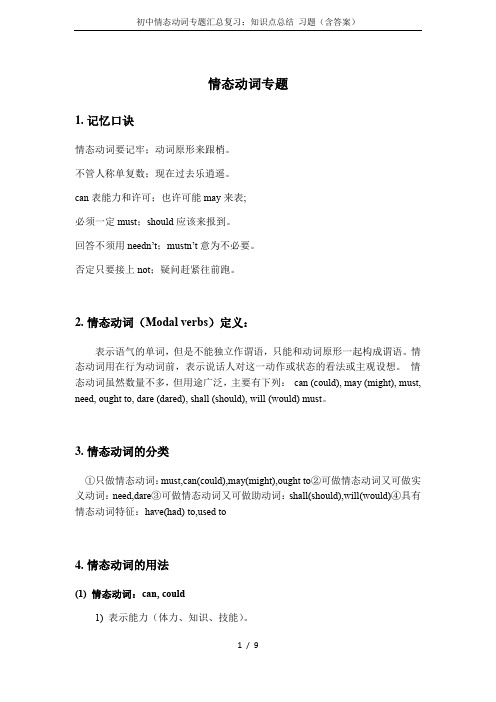
情态动词专题1.记忆口诀情态动词要记牢;动词原形来跟梢。
不管人称单复数;现在过去乐逍遥。
can表能力和许可;也许可能may来表;必须一定must;should应该来报到。
回答不须用needn’t;mustn’t意为不必要。
否定只要接上not;疑问赶紧往前跑。
2.情态动词(Modal verbs)定义:表示语气的单词,但是不能独立作谓语,只能和动词原形一起构成谓语。
情态动词用在行为动词前,表示说话人对这一动作或状态的看法或主观设想。
情态动词虽然数量不多,但用途广泛,主要有下列:can (could), may (might), must, need, ought to, dare (dared), shall (should), will (would) must。
3.情态动词的分类①只做情态动词:must,can(could),may(might),ought to②可做情态动词又可做实义动词:need,dare③可做情态动词又可做助动词:shall(should),will(would)④具有情态动词特征:have(had) to,used to4.情态动词的用法(1) 情态动词:can, could1) 表示能力(体力、知识、技能)。
Can you lift this heavy box?(体力)[注意1] 此时可用be able to代替。
Can只有一般现在时和一般过去式;而be able to则有更多的时态。
[注意2] 当表示“经过努力才得以做成功某事”时应用be able to,不能用Can。
如:He was able to go to the party yesterday evening in spite of the heavy rain.2) 表示请求和允许。
-----Can I go now?----- Yes, you can. / No, you can’t.[注意3] 此时可与may互换。
情态动词专项讲解及练习
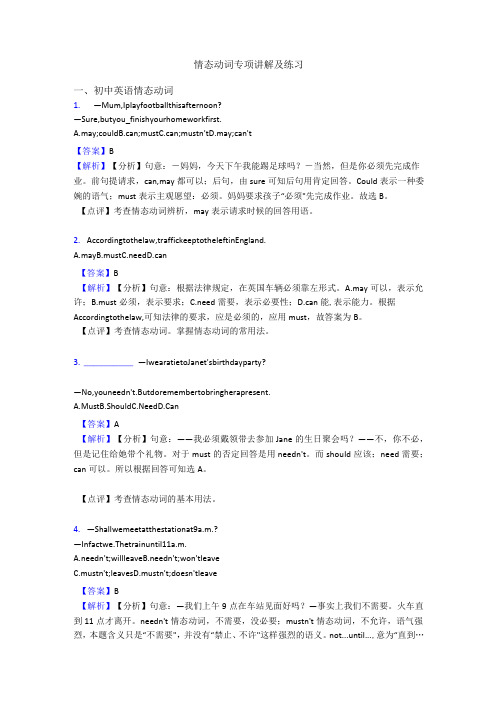
情态动词专项讲解及练习一、初中英语情态动词1.—Mum,Iplayfootballthisafternoon?—Sure,butyou_finishyourhomeworkfirst.A.may;couldB.can;mustC.can;mustn'tD.may;can't【答案】B【解析】【分析】句意:-妈妈,今天下午我能踢足球吗?-当然,但是你必须先完成作业。
前句提请求,can,may都可以;后句,由sure可知后句用肯定回答。
Could表示一种委婉的语气;must表示主观愿望:必须。
妈妈要求孩子“必须"先完成作业。
故选B。
【点评】考查情态动词辨析,may表示请求时候的回答用语。
2.Accordingtothelaw,traffickeeptotheleftinEngland.A.mayB.mustC.needD.can【答案】B【解析】【分析】句意:根据法律规定,在英国车辆必须靠左形式。
A.may可以,表示允许;B.must必须,表示要求;C.need需要,表示必要性;D.can能,表示能力。
根据Accordingtothelaw,可知法律的要求,应是必须的,应用must,故答案为B。
【点评】考查情态动词。
掌握情态动词的常用法。
3.__________ —IwearatietoJanet'sbirthdayparty?—No,youneedn't.Butdoremembertobringherapresent.A.MustB.ShouldC.NeedD.Can【答案】A【解析】【分析】句意:——我必须戴领带去参加Jane的生日聚会吗?——不,你不必,但是记住给她带个礼物。
对于must的否定回答是用needn't。
而should应该;need需要;can可以。
所以根据回答可知选A。
【点评】考查情态动词的基本用法。
4.—Shallwemeetatthestationat9a.m.?—Infactwe.Thetrainuntil11a.m.A.needn't;willleaveB.needn't;won'tleaveC.mustn't;leavesD.mustn't;doesn'tleave【答案】B【解析】【分析】句意:—我们上午9点在车站见面好吗?—事实上我们不需要。
九年级英语情态动词知识点梳理及经典练习(超详细)

九年级英语情态动词知识点梳理及经典练习(超详细)一、初中英语情态动词1・—We've got everything ready for the picnic.—Do you mean I _________ bring anything with me?A. can'tB. mustn'tC. couldn'tD. needn't【答案】D【解析】【分析】句意:一我们已经为野餐准备好了一切。
一你的意思是我不必带任何东西吗?A. can't不能;B. mustn't表示禁止,一定不要;C. couldn't不能,表示过去时态;D. needn't不必。
结合句意,故选D。
【点评】本题考查情态动词的用法。
2.—That must be Mr. John.—No, it ____ be him. I saw him off at the airport half an hour ago.A. may not B・ mustn't C. can't D. needn't【答案】c【解析】【分析】句意:一一那一泄是约翰先生。
一一不,不可能是他。
我看见他在半小时前到达机场q nay not可能不是:mustn't—左不是:can't不可能是:needn't不必,英语中,肯左的推测用must;否泄的推测用can'to依据I saw him off at the airport half an hour ago.可知不可能是他,所以应该是否立的推测,故选C。
【点评】此题考查情态动词。
弄淸每个情态动词的使用规则。
根据语境和上下文的联系确定所使用的情态动词。
3.—I missed last night's Everlasting Classics (《经典咏流传》)!—You __ care・ You can watch it online later.A. must n't B・ can't C・ may not D・ n eedn't【答案】D【解析】【分析】句意:一一我错过了昨晚的《经典咏流传》!一一你不必在意,以后你可以上网看© A. mustn't不允许:B.can't不能;C・ may not 可能不;D. needn't不必。
人教版中考英语复习专题情态动词X知识点总结及经典习题(含答案)
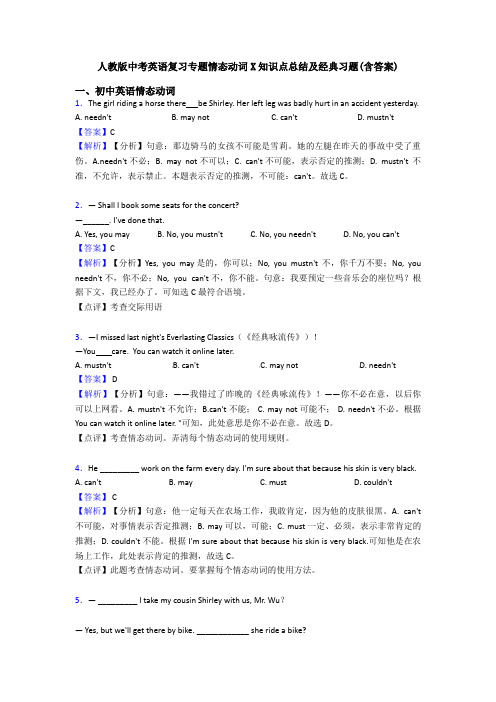
人教版中考英语复习专题情态动词X知识点总结及经典习题(含答案)一、初中英语情态动词1.The girl riding a horse there be Shirley. Her left leg was badly hurt in an accident yesterday.A. needn'tB. may notC. can'tD. mustn't【答案】C【解析】【分析】句意:那边骑马的女孩不可能是雪莉。
她的左腿在昨天的事故中受了重伤。
A.needn't不必;B. may not不可以;C. can't不可能,表示否定的推测;D. mustn't 不准,不允许,表示禁止。
本题表示否定的推测,不可能:can't。
故选C。
2.— Shall I book some seats for the concert?—______. I've done that.A. Yes, you mayB. No, you mustn'tC. No, you needn'tD. No, you can't【答案】C【解析】【分析】Yes, you may是的,你可以;No, you mustn't 不,你千万不要;No, you needn't不,你不必;No, you can't不,你不能。
句意:我要预定一些音乐会的座位吗?根据下文,我已经办了。
可知选C最符合语境。
【点评】考查交际用语3.—I missed last night's Everlasting Classics(《经典咏流传》)!—You care. You can watch it online later.A. mustn'tB. can'tC. may notD. needn't【答案】 D【解析】【分析】句意:——我错过了昨晚的《经典咏流传》!——你不必在意,以后你可以上网看。
初中英语情态动词详细用法归纳(含练习及答案)
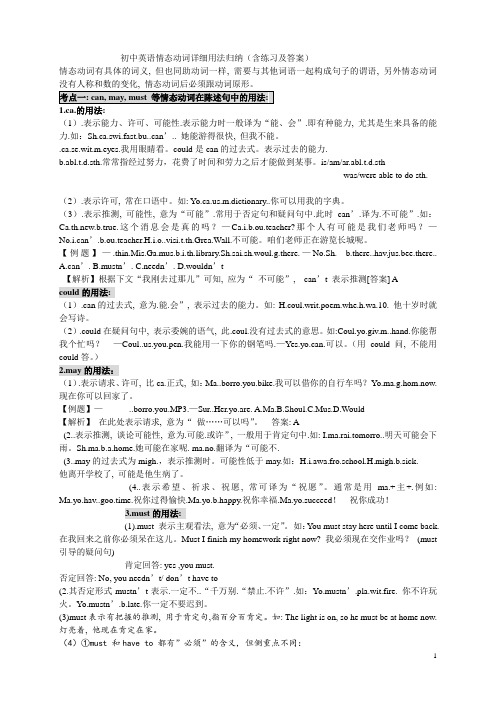
初中英语情态动词详细用法归纳(含练习及答案)情态动词有具体的词义, 但也同助动词一样, 需要与其他词语一起构成句子的谓语, 另外情态动词没有人称和数的变化, 情态动词后必须跟动词原形。
1.ca.的用法:(1).表示能力、许可、可能性.表示能力时一般译为“能、会”.即有种能力, 尤其是生来具备的能力.如:Sh.ca.swi.fast.bu..can’.. 她能游得很快, 但我不能。
.ca.se.wit.m.eyes.我用眼睛看。
could是can的过去式。
表示过去的能力.b.abl.t.d.sth.常常指经过努力,花费了时间和劳力之后才能做到某事。
is/am/ar.abl.t.d.sthwas/were able to do sth.(2).表示许可, 常在口语中。
如: .m.dictionary..你可以用我的字典。
(3).表示推测, 可能性, 意为“可能”.常用于否定句和疑问句中.此时can’.译为.不可能”.如:Ca.th.new.b.true.这个消息会是真的吗?—Ca.i.b.ou.teacher?那个人有可能是我们老师吗?—No.i.can’.b.ou.teacher.H.i.o..visi.t.th.Grea.Wall.不可能。
咱们老师正在游览长城呢。
【例题】—.thin.Mis.Ga.mus.b.i.th.library.Sh.sai.sh.woul.g.there.—No.Sh.__b.there..hav.jus.bee.there..A.can’.B.mustn’.C.needn’.D.wouldn’t【解析】根据下文“我刚去过那儿”可知, 应为“不可能”, can’t 表示推测[答案] Acould的用法:(1).can的过去式, 意为.能.会”, 表示过去的能力。
如: H.coul.writ.poem.whe.h.wa.10. 他十岁时就会写诗。
(2).could在疑问句中, 表示委婉的语气, 此.coul.没有过去式的意思。
《中考英语》初中英语语法知识—情态动词的全集汇编含答案解析
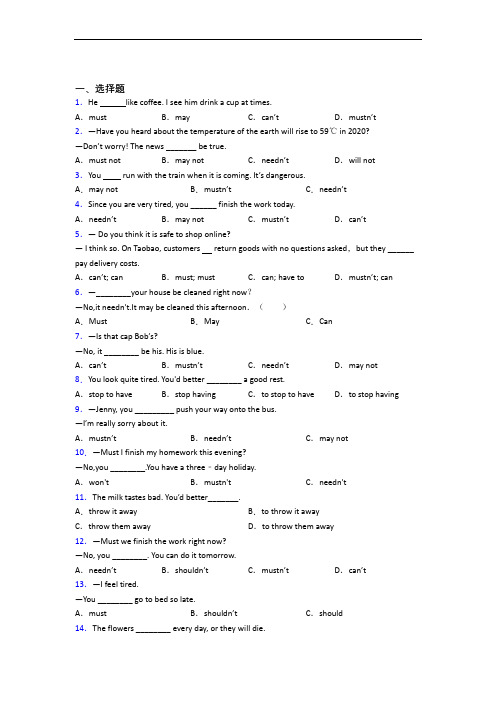
一、选择题1.He like coffee. I see him drink a cup at times.A.must B.may C.can’t D.mustn’t 2.—Have you heard about the temperature of the earth will rise to 59℃ in 2020?—Don’t worry! The news _______ be true.A.must not B.may not C.needn’t D.will not3.You run with the train when it is coming. It’s dangerous.A.may not B.mustn’t C.needn’t4.Since you are very tired, you ______ finish the work today.A.needn’t B.may not C.mustn’t D.can’t5.— Do you think it is safe to shop online?— I think so. On Taobao, customers return goods with no questions asked,but they ______ pay delivery costs.A.can’t; can B.must; must C.can; have to D.mustn’t; can 6.—________your house be cleaned right now?—No,it needn't.It may be cleaned this afternoon.()A.Must B.May C.Can7.—Is that cap Bob’s?—No, it ________ be his. His is blue.A.can’t B.mustn’t C.needn’t D.may not8.You look quite tired. You'd better ________ a good rest.A.stop to have B.stop having C.to stop to have D.to stop having 9.—Jenny, you _________ push your way onto the bus.—I’m really sorry about it.A.mustn’t B.needn’t C.may not10.—Must I finish my homework this evening?—No,you ________.You have a three﹣day holiday.A.won't B.mustn't C.needn't11.The milk tastes bad. You’d better_______.A.throw it away B.to throw it awayC.throw them away D.to throw them away12.—Must we finish the work right now?—No, you ________. You can do it tomorrow.A.needn’t B.shouldn’t C.mustn’t D.can’t13.—I feel tired.—You ________ go to bed so late.A.must B.shouldn’t C.should14.The flowers ________ every day, or they will die.A.must water B.can be wateredC.should water D.must be watered15.Everyone______ be polite to their parents.A.could B.may C.should D.can16.–Is Mike coming to the fashion show tomorrow?--I’m not sure. He ______ not come.A.must B.can C.may D.should 17.—Could you help me download some Taylor Swift’s songs from Ku Gou?—Sorry, people download music from the Internet without paying, because it’s against the law. A.wouldn’t B.need n’tC.mustn’t D.couldn’t18.一Already five people in the taxi, but the driver managed to take me as well.一Terrible, and it be an uncomfortable journey.A.can B.should C.must D.need19.---You look very pretty, if I say so.---Thanks a lot for saying that.A.must B.may C.will D.have to 20.Even the top student can't work out this problem, so it________ be too difficult. A.must B.may C.can D.need21.-Mum, must I stay there the whole day?-No, you__________. You__________ come back after lunch, if you like.A.mustn’t; can B.needn’t; must C.needn’t; may22.From March 23rd, 2013, anyone under the age of 14 ________ go into Disneyland alone. A.couldn’t B.mustn’t C.needn’t D.mightn’t【参考答案】***试卷处理标记,请不要删除一、选择题1.B解析:B【解析】【详解】句意:他可能喜欢咖啡。
《中考英语》初中英语语法知识—情态动词的分类汇编附答案解析
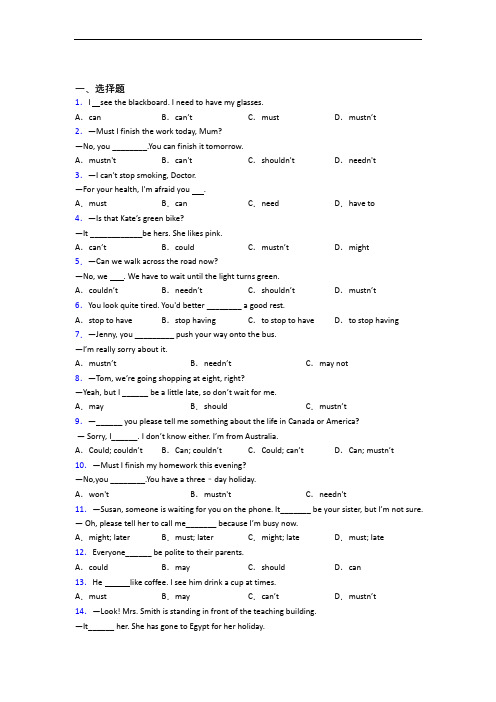
一、选择题1.I see the blackboard. I need to have my glasses.A.can B.can’t C.must D.mustn’t 2.—Must I finish the work today, Mum?—No, you ________.You can finish it tomorrow.A.mustn't B.can't C.shouldn't D.needn't3.―I can't stop smoking, Doctor.―F or your health, I'm afraid you .A.must B.can C.need D.have to4.—Is that Kate’s green bike?—It ____________be hers. She likes pink.A.can’t B.could C.mustn’t D.might5.—Can we walk across the road now?—No, we . We have to wait until the light turns green.A.couldn’t B.needn’t C.shouldn’t D.mustn’t6.You look quite tired. You'd better ________ a good rest.A.stop to have B.stop having C.to stop to have D.to stop having 7.—Jenny, you _________ push your way onto the bus.—I’m really sorry abou t it.A.mustn’t B.needn’t C.may not8.—Tom, we’re going shopping at eight, right?—Yeah, but I ______ be a little late, so don’t wait for me.A.may B.should C.mustn’t9.—______ you please tell me something about the life in Canada or America?— Sorry, I______. I don’t know either. I’m from Australia.A.Could; couldn’t B.Can; couldn’t C.Could; can’t D.Can; mustn’t 10.—Must I finish my homework this evening?—No,you ________.You have a three﹣day holiday.A.won't B.mustn't C.needn't11.—Susan, someone is wait ing for you on the phone. It_______ be your sister, but I’m not sure.—Oh, please tell her to call me_______ because I’m busy now.A.might; later B.must; later C.might; late D.must; late 12.Everyone______ be polite to their parents.A.could B.may C.should D.can13.He like coffee. I see him drink a cup at times.A.must B.may C.can’t D.mustn’t 14.—Look! Mrs. Smith is standing in front of the teaching building.—It______ her. She has gone to Egypt for her holiday.A.must be B.mustn’t be C.can be D.can’t be 15.—Jenny, we buy Mom presents. We can clean the house from top to bottom.—Good idea! It’s a special present for Mother’s Day.A.can’t B.mustn’tC.shouldn’t D.needn’t16.It is 11:00 p.m now. Peter hasn't come back yet. His mother ______ be very mad at him. A.may B.can C.must D.need17.One ______ easily lose his way when he visits or comes to a new place.A.may B.must C.need D.should18.We _______ keep the new traffic law and learn how to protect ourselves.A.may B.should C.can D.need 19.—Could you please hang out with me this afternoon?—______. I have to make a plan for Clean-Up Day.A.Sorry, I couldn’t B.Sorry, I can’tC.Sure, I can D.Sure, I could20.—Must I go out to have dinner with you, Mum?—No, you , my dear. You’re free to ma ke your own decision.A.shouldn’t B.mustn’t C.needn’t D.can’t 21.(2017·甘肃白银·10)—I wonder if these are Danny's glasses.—They________be Danny's. He doesn't wear glasses.A.can't B.must C.mustn't D.can22.The milk tastes bad. You’d better_______.A.throw it away B.to throw it awayC.throw them away D.to throw them away【参考答案】***试卷处理标记,请不要删除一、选择题1.B解析:B【解析】【分析】【详解】句意:我看不到黑板了。
中考英语情态动词专题练习(含解析)

中考英语 -神态动词专题练习(含分析)一、单项选择题1.Hurry up! Your homework in one hour.A. must finishB. will finishC. must be finishedD. won't finish2. — How nice the building is! What is it for?— It_______ a hotel. But I'm not sure.A. must beB. have to beC. may beD. can be3. — May I use your mobile phone for a while, Mum?— No, you. You have already used it to play for two hours.A.shouldn'tB.needn'tC.mustn'tD.won't4. — Is John coming by train?— He should, but he A.mustC. may not. He likes driving his car, but I'm not quite sure.B.canD. need5.一 I hear you have a home robot.一 Yes,it's amazing. It do all my housework.A. mustB. shouldC. couldD. can6.-- May I borrow your books?-- Yes,you______.A. mayB. canC. mustD. need7. — I can't stop playing computer games.— For your health and study, my boy, I am afraid you .A. canB. mayC. mustD. have to8.This toy Mickey Mouse _______be Amy's. She's the only kid at thepicnic.A. mustB. canC. needD. can't9.Look at the sign! It says“ No Smoking!” You ________ smoke here. It' dangerous.A. mustn'tB. ought not toC. needn'tD. don't have to10. — Can you stay here for the party?— Sorry, I ______. I have to go to a meeting.A. can'tB. mustn'tC. needn'tD.shouldn't11.—Must I return the book this morning?—No, you ______. But you ______ return it before supper.A. needn't; mustB. mustn't; canC. mustn't;may D. can't; need12. — _____ you go out to dinner with me tonight, Laura?—That's very nice of you, but I have other plans.A. ShouldB. NeedC. CanD. Must13.You____ return the book now. You can keep it next week if you like.A. mustB. mustn'tC. needn'tD. have to14. — I wonder if this smart phone is Mary's.—It ________ belong to her.________ is totally different from this one.A. mustn't; HerB. can't; HerC. can't;Hers D. may; Hers15.Living in the country side _____ fun, because the nature there is sobeautiful.A. can't beB. may beC. mustbe D. /16. — I saw Mr. Green at school this morning.—No, it _____ him. He flew to Canada last week.A. can beB. must beC. can'tbe17.—We need to tell people about the city park clean-up.—Let's handout notices. Or we __________ put up signs.A. couldB. have toC.must18.—Must I clean the room now, Mr. White?—No, you.A. shouldn'tB. needn'tC. wouldn'tD. can't19. —I take the PE test, Mr Zhang?—Yes, you must.A. CanB. WillC. ShouldD. Must20. — Why ______ we close that chemical factory?—Because it has caused lots of pollution. We need better environment.A. mustB. canC. may21.Is Mr. Smith in his office now?No, he there. I saw him in the library a minute ago.A. may beB. must beC. can'tbe D. won't be22.She said I should see a doctor.A. couldB. mustC. oughtto23.-- I don't care what my teachers think.-- Well, you.A. couldB. wouldC. shouldD. might24.The text is available online so you ________ have a copy of it now.A. can'tB. shouldn'tC. needn'tD.mustn't25.— Can your sister ______ volleyball?— Yse,she can. But she ______ play it very well.A. playing ;can'tB. playing; canC. play;can'tD. play; can26.The man is feeling much better now, so you ______ call a doctor.A. can'tB. mustn'tC. needn'tD. shouldn't27. — ________ we clean the classroom immediately?—No, you ________. You ________ clean it after school.A. Must; needn't; canB. Need; mustn't; mayC. Must; mustn't; canD. Shall; can't; may28. — Can I walk across the road now, mum?— No, you_______. You have to wait until the light turns green. A. couldn't B. shouldn't C. mustn'tD. needn't29.Ann can _________ Chinese songs very well.A. singB. singsC. singing二、填空题30.用神态动词填空。
(最新整理)初中英语中考情态动词考点及练习
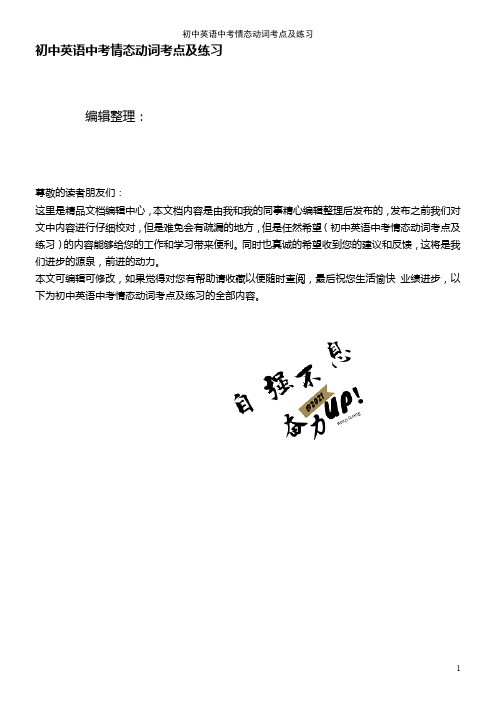
初中英语中考情态动词考点及练习
编辑整理:
尊敬的读者朋友们:
这里是精品文档编辑中心,本文档内容是由我和我的同事精心编辑整理后发布的,发布之前我们对文中内容进行仔细校对,但是难免会有疏漏的地方,但是任然希望(初中英语中考情态动词考点及练习)的内容能够给您的工作和学习带来便利。
同时也真诚的希望收到您的建议和反馈,这将是我们进步的源泉,前进的动力。
本文可编辑可修改,如果觉得对您有帮助请收藏以便随时查阅,最后祝您生活愉快业绩进步,以下为初中英语中考情态动词考点及练习的全部内容。
A。
don’t B. mustn’t C. needn’t D. wouldn’t ()14. —Must I finish watering the flowers now?
—No, you________。
A. must B。
won’t C。
needn’t D。
can’t ()15。
-I can’t give up smoking, doctor。
-For your health, I'm afraid you ________.
A. may
B. can
C. have to D。
must。
- 1、下载文档前请自行甄别文档内容的完整性,平台不提供额外的编辑、内容补充、找答案等附加服务。
- 2、"仅部分预览"的文档,不可在线预览部分如存在完整性等问题,可反馈申请退款(可完整预览的文档不适用该条件!)。
- 3、如文档侵犯您的权益,请联系客服反馈,我们会尽快为您处理(人工客服工作时间:9:00-18:30)。
情态动词【情态动词】又叫情态助动词。
它们具有以下特点:⑴它们必须与其他动词连用,即:情态动词+动词原形表示说话人对所述动作的看法,如需要、可能、意愿或怀疑等。
⑵绝大多数情态动词没有人称和数的变化,即第三人称单数不加-s(以be和have 开头的情态动词短语除外)。
⑶在意义上,情态动词具有“多义性”。
例:can既可表示能力,又可表示可能、允许等意义。
【情态动词的基本用法】1. can的基本用法:⑴表示体力或智力上的能力,即“能够,会”,可与be able to转换。
例:He can speak English. = He is able to speak English.—Can you play basketball?— No, I can’t.如果表示将来具备的能力,要用will be able to。
例:If I have a good sleep, I will be able to do the problem.⑵表示许可,主要用于口语,书面语一般用may。
例:—Can we go home now, please?— No, you can’t.You can only smoke in this room.You can’t keep the library books for more than a month.⑶表示“可能”,与may同义,但一般用在疑问句中。
例:What can he possibly want?在否定句中,否定形式can’t表示推测“不大可能”。
例:Anybody can make mistakes.The news can’t be true.与第一、二人称连用时,还可以就可能的解决问题的方式或可能的行为提出建议。
在这里,也可用could使语气婉转。
例:Can / Could we meet again next week? 下周我们可以再见面吗?—What shall we do? 我们怎么办呢?— We can / could try asking Lucy for help. ——我们可以请露茜帮忙试试看。
You can / could help me with the cooking. 你可以帮我做饭。
2. may的基本用法:⑴表示“许可”,用can比较口语化。
例:You may / can come if you wish. 如果你想来,你就来。
You may not pick flowers in this park. 本公园内不许摘花。
(may not表示按规定不许可,如果用mustn’t则表示说话人不许可。
)—May I smoke here? 我可以在这里抽烟吗?—No, you mustn’t.不行。
(mustn’t表示明确的禁止。
)⑵肯定句中表示推测,“可能”。
例:It may rain tomorrow. 明天可能会下雨。
The news may not be true. 这个消息可能不会是真的。
注意:如果在疑问句中表示“可能”,通常用can。
例:Can it be true? 那会是真的吗?Who can he be? 他究竟是谁呢?⑶【注意】:—May I/we……?—Yes, you may./—No, you mustn’t.3. must的基本用法:⑴表示必须,强调说话人的主观意志。
例:I must go now, or I’ll be late.You must be here by ten o’clock.【注意】:表示“必须“时,must的否定式为needn’t,或don’t have to ,而不是mustn’t。
也就是:—Must I/we do it now?—Yes, you must .—No, you needn’t/don’t have to .例:—Must I go with them?—No, you.⑵表示推测,一般只用于肯定陈述句,表示非常肯定。
例:She didn’t look at me. She must be angry. 她不朝我看,一定是生气了。
He is good at English. He must know the word. 他英语好,准知道这个词。
You must be Mr. Jones. 想必您就是琼斯先生吧。
4. have to的基本用法:have to可视为情态动词,但它与其他情态动词在用法上稍有不同。
其他情态动词没有人称和数的变化,而have to却有人称和数的变化,要视主语的不同而变化。
例:I / You / We / They have to….He / She / It has to….You don’t have to….Does she have to…?have to =have got to,意思是“必须,不得不”。
和must不同之处:must强调主观需要have to强调客观需要。
例:Sorry, I have to leave now. 对不起,现在我得走了。
I’ve got to go to a meeting. 我得去参加一个会议。
Will he have to work deep into the night? 他将不得不工作到深夜吗?5. need的基本用法:need的基本词义是“需要”,它既可作情态动词,又可作实义动词。
⑴ need用作情态动词时,只用于否定句和疑问句。
它只有一种形式,后接动词原形。
例:I don’t believe you need worry. 我相信你没有必要焦急。
—Need we go so soon? 我们需要这么早就去吗?— Yes, we must. / No, we needn’t. 是的,必须。
/不,不必。
So I needn’t tell him, need I? 所以我不需要告诉他,对吧?请比较以下两句话的不同意思:You needn’t buy the coat. 你没有必要买那件外衣。
(你还没买)You needn’t have bought the coat. 你没有必要买这件外衣的。
(而你却买了)【注意】:—Need I/we……?—Yes,you must ./—No, you needn’t/ don’t have to .⑵need用作实义动词时,有时态、人称和数的变化。
如果人作主语,一般后接带to的动词不定式。
即need to do sth;如果物作主语,一般后用need to be done 或need doing sth。
例如:I need to look up this word in the dictionary.My watch needs mending/to be mended. 我的手表需要修理了。
We don’t need to work today. (= We needn’t work today.)Does he need to go right now? (= Need he go right now?)6. had better的基本用法:had bette r常略作’d better。
现代语法认为它是一个助动词,因为它后接不带to的动词不定式。
had better do sth意思是“最好做某事;还是做某事比较好”。
例:You’d better get some sleep. 你最好睡一会儿。
You’d better not do that again. 你最好别再做那件事。
What had we better do now? 我们现在怎么做才好呢?Hadn’t we better tell her the truth? 我们是否最好不告诉她真相?【注意】:You’d better….表示劝告或委婉的命令,对长辈不宜使用。
7. could, should, would, might表示推测:①.must多用于肯定句中表示把握性极大的推测,意思为“一定、肯定”。
如: You have worked hard all day. You must be tired. 你已辛苦工作一整天了,一定累了。
The book must be his. His name is on the cover. 这本书一定是他的,封面上写着他的名字。
【注意】must不表推测时,在肯定句中意思为“必须(强调内在的职责)”,在否定句中意思为“不许、禁止”,以它开头的疑问句否定回答常用needn’t或don’t (doesn’t) have to。
如:We must obey the traffic rules. 我们必须遵守交通规则。
Cars mustn’t be parked here. 此处严禁停车。
—Must we hand in the papers this week? 我们必须本星期交论文吗?—No, you needn’t. 不,你们不必(本星期交)。
②. can / could多用于否定句、疑问句或感叹句中表示推测、怀疑,两者在时间上没有差别。
用can时不相信的程度更强一些,can’t常常译为“不可能”。
如:The man under the tree can’t be Tom. He’s gone to England.这个人不可能是Tom,他已经去英国了。
Can it be true that he was fooled by a five-year-old boy? 他被一个五岁的孩子愚弄了,这能是真的吗?Could this be an excuse? 这会不会是个借口?How can you be so careless! 你怎么这样粗心!③.may / might多用来表示把握性不大的推测,意思为“也许、可能”, might比may的把握性更小一些。
may not在否定句中常常译为“可能不”。
(注意区分“不可能”与“可能不”在把握性大小上的差异。
) 如:Mr. Wang may know Professor Li’s telephone number.王先生也许知道李教授的电话号码。
This might be the key Tom has been looking for.这可能就是汤姆一直在找的钥匙。
She may not be there today. 今天她可能不在那儿。
一、典型例题【中考链接】()1.—Who is the man over there? Is it Mr. Li?— No, it ______ be him. Mr. Li is much taller.A. mustn’tB. may noC. can’tD. needn’t()2.—Must I go with them tomorrow?— No,you ______.A. mustn'tB. shouldn'tC. needn'tD. can't()3.—______ I take some photos in the hall?— No, you ______.A. Can, needn’tB. Must, mustn’tC. Could, won’tD. May, mustn’t()4.—Dad, must I finish my homework today?—No, you ________. You may do it tomorrow.A. needn’tB. mustn’tC. don’tD. won’t()5.—The lake is said to be dry. Is that true?—It _______.Look, some kids are swimming in it.A. must be trueB. can’t be trueC. may not be true()6.—What is your mother going to do this Saturday?—I’m not sure. She _____ go to see my grandmother.A. canB. mustC. may()7.—Susan has bought a large house with a swimming pool.—It ______ be very expensive. I never even dream about it.A. mustB. mightC. can’tD. shouldn’t()8.—Listen! Is Professor Johnson giving a report in the hall?—No, it be him. He has gone to Japan.A. needn’tB. may notC. mustn’tD. can’t()9.—Let’s go to the West Hill Park by taxi.—Oh, it is not far away from here. We _______take a taxi.A. couldn’tB. mustn’tC. needn’tD. can’t()10.—Can you play the piano?—Yes, I _______. I often practice it on weekends.A. needn’tB. needC. can’tD. can三、课后练习一、用can, may, must, need, have to, had better的适当形式填空:1.You ________________ return the library book on time.2.I ______________ (not) find the way to the hospital. _______________ you show me the way?3.—________________ I finish the work right now?— No, you ________________ (not). You ____________ do it later.4.He said he ________________ (not) come tonight.5.Her mother was ill. She ________________ stay at home and look after her.6.It’s time for class. You ________________ stop playing football or you __________be late for class.7.We ________________ start right now, or they would get there first.8.The cloud is lifting, so it ________________ (not) be a rainy day tomorrow.二、选择填空()1.—Do we have to finish our homework this afternoon?—Yes, you ________.A. mustB. canC. mayD. need()2. —Must I be in hospital for a week,Doctor?—No,you . You can go back home tomorrow.A.mustn’tB. needn’tC. must()3. The desk is not dirty. You _______clean it.A. mustn’tB. shouldn’tC. needn’t C. can’t()4. —May I watch TV for a while?—No, you _______. You have to finish your homework first.A. shouldn’tB. needn’tC. mustn’tD. won’t()5.—Is Jessica giving us a speech this evening?—No, it ________be her. She________ to Japan.A. mustn’t; has goneB. mustn’t ;has beenC. can’t ;has goneD. can’t ;has been()6. It’s the library! So you________ know shouting is not allowed here.A. canB. mustC. needD. may()7. Boys and girls, don’t forg et your report . It ______ today.A. can’t finishB. can’t be finishedC. should finishD. should be finished()8.—Mr Smith must have been to your home this morning.—No, he ______ ,because he didn’t know my address.A. couldn’tB. can’tC. mustn’tD. may not()9. —Must I mop up the window now?—No, you________.A.needn’tB. can’tC. shouldn’tD. mustn’t()10. —Is Lucy knocking at the door?—No. It ________ be Lucy. She is in Japan now.A. needn’tB. mustC. can’t()11. —Another cup of coffee?—No, thanks. I _____ be off. Mary is waiting for me.A. canB. mayC. mustD. might()12. —I’m a little tired. Let’s go to the zoo by taxi.—We take a t axi. It’s not far from here.A. can’tB. mustn’tC. couldn’tD. needn’t ()13. If the traffic light is red, you ________ cross the road. It’s very dangerous.A. don’tB. mustn’tC. needn’tD. wouldn’t ()14. —Must I finish watering the flowers now?—No, you________.A. mustB. won’tC. needn’tD. can’t()15. —I can’t give up smoking, doctor.—For your health, I’m afraid you ________.A. mayB. canC. have toD. must。
